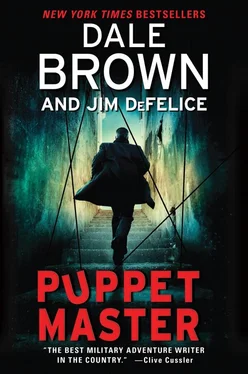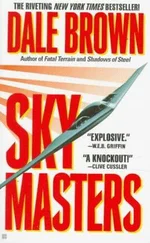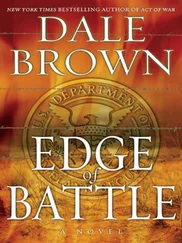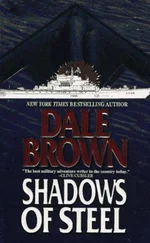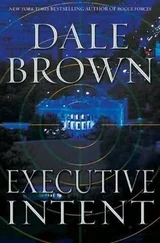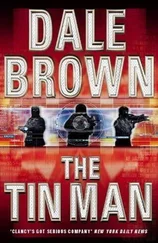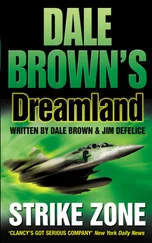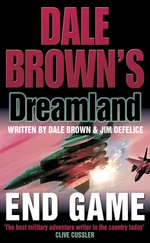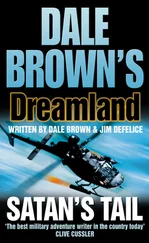Just get it done.
White poked his head out of the cabin. “What are you doing?”
“Ducking a Russian patrol, what do you think?” spat Tolevi. “I’m going to slide around to the east.”
“You’re heading right toward their base.”
“Relax. We’re not worth getting out of bed for.”
“They can sink us from shore.”
“Unlikely.”
Actually, Tolevi had lost a boat to Russian patrols just after the Crimea takeover, probably in circumstances like this. But this wasn’t a good time to share that information.
“Everybody just hold on,” he announced. “I have to do some maneuvers.”
“Depth is getting very shallow.”
“I can see that.”
He angled closer to the shore, then cut his speed, unsure in the dark what might be ahead. The patrol boat was still coming east, though it was now pointing a little south.
“He can’t follow us here,” Tolevi told White as he cut the motor almost to idle. “We’ll be quiet and slip north.”
“Then what?”
“I’ll tell you that when I figure it out.”
* * *
Still a little queasy, Chelsea twisted around on the bench to see what they were running from. The Russian patrol boat was playing searchlights across the water less than two miles away.
“They don’t have a good idea where we are,” said Bozzone. “We’re close enough to the shore that they lose us in the clutter. Their radars are not as good as the radars in the West.”
Something clunked on the far side of the boat.
“Damn!” cursed Tolevi at the wheel.
The motor revved. They tipped sideways. For a moment, Chelsea thought they were going over. Then the boat suddenly surged ahead, swerving and righting itself.
“We gotta make it in one piece!” shouted Beefy.
“Everybody quiet,” responded Tolevi coldly. “Sound carries on the water. Besides, I need to concentrate.”
* * *
Tolevi tucked back toward the deeper water. He had the shadow of land on his left.
The next fifteen minutes were critical. If he could get far enough north before the patrol boat turned, he’d be free — it could never keep up in the shallow water.
On the other hand, if it turned back west and went north now, it could make a race of it. With the island between them, he would have an edge in speed, but it would have a shorter distance.
Fifty-fifty.
Of course, if it turned, it was giving up blocking him from going south. But he’d already discarded that possibility.
A minute passed. Another.
Once past the bottleneck, he’d be good. Keep going.
“She’s turning off,” said Porter.
“Giving up?”
“Moving pretty fast,” said the CIA officer. “West, northwest.”
“Damn,” muttered Tolevi. He slammed the throttle, trying to make the most of his head start.
Boston — same time
“There are two more patrol boats coming out in the north,” said Johansen, pointing to the sitrep screen.
“Can we warn them?” asked Massina.
“That will tip the Russians off that something’s there. Better letting Tolevi handle it.”
Massina dropped into his chair, hands behind his head. His artificial limb felt cold.
Helpless.
Kerch Strait, Black Sea — minutes later
Tolevi cut the engines, listening to the radio chatter. The Russians were definitely looking for them.
He was north of the island, a few hundred yards south of a rocky isthmus that poked down from the Russian side. If it weren’t for the naval base directly ahead, he could just slide along the beach in the shallow water. But the radio made it clear that the Russians there were alert and he’d have little chance of getting away without being spotted.
“Let me see your NOD,” he told Porter, asking for his night glasses.
The lookout came over with them.
“Take the helm. Just stay on this course, dead ahead, slow, not too much closer to the land.”
“No worries there.”
Tolevi took the glasses and climbed up onto the forward deck, bracing himself on the rail. He couldn’t see the Russian patrol boat that had followed him, or any of the other boats they were talking to.
There was a merchant ship, a smallish cargo carrier, about a mile away in the channel, heading north.
My shadow.
Tolevi scrambled back to the wheel. Revving the motor, he started in a beeline for the cargo ship.
“Keep watching for the patrol boats,” he told Porter and the other lookout. “They’re going to come right down there. Probably they’ll split, one forward, one kind of back up on either side, probably toward land, figuring we’re hiding in the shadows. I’m going to swing around that cargo boat and ride near it for a bit.”
“That’s right in the middle of the channel.”
“Yes.”
* * *
Chelsea watched the lights of the cargo vessel grow. It seemed oblivious to them.
“He’s using the bigger boat to hide,” explained Bozzone. “Old smugglers’ trick.”
If there were people aboard the cargo vessel — and surely there were — Chelsea couldn’t see them. The large, lumbering craft stayed on its course, moving very slowly parallel to the shore, in exactly the direction they were taking.
There were one or two ships beyond, one moving north, one coming south. The speedboat slid around the port side of the cargo vessel, slowing to ride parallel.
“There’s the patrol boat,” said Beefy, pointing aft.
“It’s what’s ahead that counts, right?” asked Chelsea. She got up, legs still rubbery, and made her way over to the cockpit area.
“Another patrol boat further north,” said White, emerging from below. “They’re talking back and forth.”
“They see us?”
“No, but I think they may suspect we’re near the cargo craft.”
“What if you had a diversion?” asked Chelsea. “Make them think we’re somewhere else?”
“Brilliant,” mocked Tolevi. “You have something like a destroyer handy?”
“How about some flares?”
“That’ll show them where we are. Go back to throwing up.”
What an asshole.
“If we load some flares on one of the drones and set them off back near the shore,” said Chelsea tightly, “maybe they’ll think we crashed.”
Tolevi didn’t answer.
“Well?” she asked.
“If you can do it, sure,” he told her, the edge in his voice gone.
Chelsea wobbled back to Bozzone.
“Help me get one of the Nighthawks ready,” she told him.
* * *
There were two patrol boats north, one right at the choke point and another somewhere farther north, according to the radio steaming toward it. Meanwhile, the craft they had ducked to the south was steaming northward.
Tolevi edged the speedboat so close to the cargo ship that he could just about touch the hull.
One good set of waves and they would be swimming. But at least according to the radio chatter, the Russians still weren’t sure where they were. The cargo ship was like a shield, blocking their view.
Not for long. The boat from the south told the others it was heading for it.
“If you’re launching that UAV,” Tolevi told Chelsea, “do it quick.”
* * *
Chelsea inspected the small, battery-powered UAV as Bozzone pulled it from its case. With a wingspan roughly as wide as a desk, the UAV was designed for slow, silent surveillance. It had two electric engines, one front, one back. Unlike Peter, it was not fully autonomous; it needed to be programmed in advance, or, alternatively, it could follow radio commands.
Читать дальше
